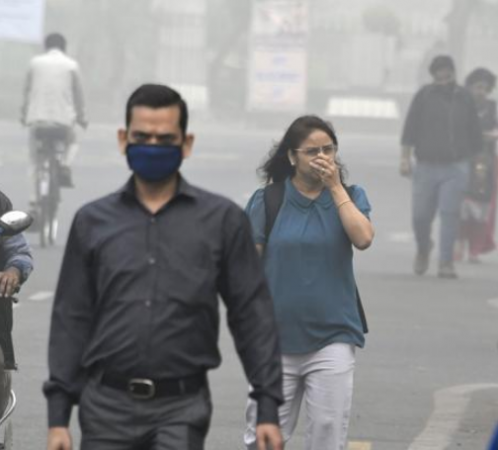
The air quality in the national capital has declined further with the thick layer of toxic smog covering the capital, which is affecting visibility and all forms of traffic. As per the data is collected on Sunday (December 3), at least seven out of 22 monitoring stations registered a 'severe plus or emergency' a huge health risk and forcing residents of Delhi-NCR to breathe toxins as news agency IANS published.
The Air Quality Index (AQI) measured in Delhi at 4 p.m. was 351 (on a scale of 0 to 500), and by 6 p.m. it reached 361. And on Saturday, the AQI of Delhi was 331. During, the System of Air Quality Weather Forecasting And Research (SAFAR) has foretold that the air quality in the national capital is set to decline over the next three days. Weather analysts say a sudden increase in the moisture in the air is a reason behind the dip in air quality.
Let's see how do air pollutants affect the body?
Carbon monoxide - CO reduces the amount of oxygen carried by haemoglobin around the body, specifically to vital organs like the brain, nervous tissues. Carbon monoxide affects healthy and unhealthy people alike. However, children and unborn babies, the elderly, and people with heart, circulatory, or lung disease are at a greater risk of CO poisoning. High levels of CO in the body can severely affect the central nervous system and cause symptoms like headaches, nausea, fatigue, memory loss and disorientation. It can also lead to heart problems, cerebral edemas, comas, convulsions and even death.
Nitrogen dioxide - The health effects of NO2 include wheezing, coughing, asthma, bronchitis, colds and flu. Since nitrogen dioxide inflames the lining of the airways, it can reduce immunity to the lung infection. People with asthma and heart disease are most at risk.
Sulphur dioxide - People with asthma or other respiratory diseases are at greater risk from exposure to SO2. The health results of sulphur dioxide are felt very quickly, in fact, most people would notice the symptoms such as coughing, wheezing, breathing difficulty, or a tight feeling around the chest, in 10 or 15 minutes after breathing it in. It can also cause heart failure, psychic alterations, eye irritation, etc.
Ozone - Breathing air containing ozone can aggravate the lining of the respiratory tract, causing a variety of health problems including asthma, chest pain, coughing, throat irritation, and congestion. People with asthma, children, and older adults are the most vulnerable groups.
Lead - Lead is a health risk and when it' smelled, it hits multiple body systems including the nervous system, immune system, kidney function, reproductive and developmental systems and the cardiovascular system.